- Home
- David Gemmell
The Hawk Eternal Page 8
The Hawk Eternal Read online
Page 8
“Do not interfere,” Agwaine warned them. “I mean to cut his heart out.”
“Move behind me,” Layne told Gaelen.
“I’m not afraid of him.”
“Move behind me!” The voice was not raised, and yet had great authority. Even so, Gaelen’s anger was so great now that he was ready to refuse. Then the giant laid a massive hand on his shoulder and Gaelen felt the power in the grip.
“Best do as he says,” said the huge youth softly. “Layne’s usually right.”
Gaelen obeyed and Layne stepped forward until his stomach pressed against Agwaine’s dagger.
“Do you really want to kill me, cousin?” he asked.
“You know I will not.”
“Then think on it. The boy did well. He knew you planned to thrash him and he took you all on; he has courage. It would not be fitting to punish him now—would it?”
Agwaine sheathed his blade. “He is a Lowlander, and I will never accept him. Neither will my friends. He will be shunned by all who follow me.”
“I’ll not shun him, Agwaine. Neither will Lennox.”
“Then you are my friend no longer. Let’s go!” he told the others. As they trooped away Gwalchmai hung back, but Draig spotted him and called out.
“I’ll see you later,” Gwalchmai replied.
Draig trotted back to his side. “You can’t stay here,” he said. “You heard what Agwaine said.”
“I stay with my friends,” said Gwalchmai.
“You’re a fool, Gwal. No good will come of it.” Draig strode off. Gaelen slid the knife back in its sheath. The tall youth with the dark hair and grey eyes turned to him, holding out his hand.
“I am Layne, son of Leofas,” he said. “This is my brother Lennox and my cousin Gwalchmai.”
Gaelen shook hands with them all. “Why did you do this for me?” he asked.
“It wasn’t for you, it was for Agwaine,” Layne told him.
“I don’t understand.”
“Agwaine is a fine friend and a brave one,” said Layne. “He acted in anger and would have regretted slaying you. He is not evil, not malicious. But he has the conceit of his father and he loves to lead.”
“I have caused you trouble. For that I am sorry.”
Layne shook his head. “You caused nothing. It was not you they were seeking to humble, but your father. Caswallon is not liked.”
“Why?”
“It is not for me to prattle on with gossip. I like Caswallon but others do not, and among the clans such matters usually end in bloodshed and family feuds. We are a violent race, Gaelen, as you have discovered.”
“Caswallon is not violent.”
“Indeed he is not. But he has the capacity for it, as you saw in the mountains with the Aenir.”
“You heard of that?”
“Who has not? My father led the hunters that escorted them from the Farlain.”
The lads settled themselves on the grass, enjoying the sunshine. Lennox and the ginger-haired Gwalchmai said little.
Layne asked Gaelen about life in Ateris, and the Aenir invasion. Gaelen found the memories too painful and switched the conversation back to Caswallon. “I know you don’t want to gossip,” he said, “but I am a stranger here, and I need to know how my . . . father earned such dislike.”
“Caswallon is the richest man in the valley. He has the largest herds and his fields carry more wheat than any save Cambil’s. But he holds himself apart from other clansmen, and the Hunt Lord hates him.”
“He doesn’t appear rich,” said Gaelen. “In Ateris rich men have . . . had . . . marble palaces and carriages of gold. And many servants. They wore rings and necklets, bracelets and brooches.”
“We have no use for such finery,” Layne told him. “We live free. Caswallon supports more than one hundred crofters. If he desired, he could start a new clan. That is rich—believe me.”
“Then why doesn’t he? I mean, if he’s so disliked it would seem to be good sense. Then he would be his own Hunt Lord.”
“He would have to surrender his valley land and find somewhere else to live, and that is no longer easy. To the northeast the Haesten control the land bordering the Lowlands. North of them are the Pallides. The rest of the land for a six-day march is all Farlain, and beyond that the minor clans—the Loda, the Dunilds, and the Irelas—fight over territory. Anyway, Caswallon is Farlain and always will be.”
“I’m damned hungry,” said Lennox suddenly.
Gaelen fished in his leather hip pouch and produced a thick slice of cold meat pie. He passed it to Lennox. Thanking him, the huge youth wolfed the pie down at speed.
“My father would also be rich,” said Layne dryly, “were it not for my brother’s appetite.”
“He’s big,” said Gaelen. “I don’t think I’ve seen anyone his age bigger.” Lennox was already more than six feet tall, with a bull-like neck and an enormous frame. His face was broad, his eyes deep-set and brown. His chin and cheeks were already darkening with the promise of a beard.
“And he’s as strong as he looks. Also, despite what you will hear, he’s no fool. He just says little. Isn’t that right, brother?”
“Whatever you say,” said Lennox, grinning.
“I don’t know why, but he likes to play the fool,” said Layne. “He lets people think he has no brains.”
“It does no harm,” said Lennox mildly.
“No, but it irritates me,” replied his brother, scowling. Gaelen would not have guessed them to be brothers. Layne, though tall, was of more slender build, his face fine-boned.
“I can’t think why it should, Layne,” said Lennox, smiling. “You are the thinker in the family.”
“Nonsense.” Layne swung to Gwalchmai. “Why so silent, little one?”
“I was thinking about Agwaine,” answered Gwalchmai. “I don’t like to make anyone angry.”
“He won’t be angry with you for long. And besides, I’m proud of you. What do you think, Lennox?”
“I think it took nerve to stay with us. You’ll not regret it, Gwal, my lad.”
“Do you think they’ll attack Gaelen again?” Gwal asked.
“No,” replied Layne. “When he has had time to think on it, Agwaine will realize that Gaelen acted like”—he grinned—“like a Highlander,” he said. “He will respect that.”
Gaelen blushed and said nothing.
“Well,” said Layne, “I think it’s time we told Gaelen about the Hunt.”
Caswallon stood nervously outside the door biting his lip, a habit he thought he had left behind in childhood. But then standing before the door of Leofas brought back memories, none of them pleasant.
When Caswallon was a child he had stolen a dagger from the home of the Sword Champion, Leofas. His foster father, Padris, had been furious when Cambil informed him of Caswallon’s misbehavior—and had sent the boy to Leofas to confess.
Caswallon had stood before the door then as now, on edge and fearful. The clansman chuckled. “You fool,” he told himself. But it didn’t help.
Rapping the door with his knuckles, he took a deep breath.
Leofas let him in without a word of greeting and pointed to a chair before the hearth. Removing his cloak, Caswallon sat down. The room was large, strewn with rugs of goatskin and wolf hide, and on the far wall hung a bearskin, dust-covered and patchy with age.
Caswallon stretched out his legs before the fire. “The last time I was here, you thrashed me with your belt,” he remarked.
“I recall that you deserved it,” said Leofas. He was a big man, not tall, but wide in the shoulder with a thick neck and heavy beard streaked with grey. But his blue eyes were keen, the stare forbidding.
“Indeed I did.”
“State your business, Caswallon,” snapped the older man.
Caswallon pushed himself to his feet, a knot of anger deep within him. “I don’t think that I will,” he said softly. “I am not the child who stole your knife, I am a man. I came here because Maggrig advised it,
and it seemed sensible, but I’ll not sit here swallowing your discourtesies.”
Leofas raised his eyebrows, waiting as Caswallon reached for his cloak.
“Would you like a drink, boy?” he asked.
Caswallon hesitated for a moment, then dropped his cloak across the back of a chair and turned to the older man. “That would be pleasant,” he said.
Leofas left the room, returning with two jugs of ale. Then he sat opposite Caswallon. “Now will you state your business?”
“Before I do, let’s clear the air. When you were young you raided all over the Druin to build your herds. So why are you set against me?”
“That’s easily answered, and I like a man who states his grievance swiftly. When I was a lad there was open warfare between the clans.
“No man knew what it was like to be rich. Raiding was often the difference between starvation and small comfort. But times changed and clans prospered. I applauded you when you began, I thought you were spirited and cunning. But then you grew rich, and yet the raids continued. And then I knew that the raids were not a means to an end but the end itself.
“Sometimes in life a man must risk death for the sake of his family, but you risk it merely for pleasure. Most men in the mountains value their clan, for it is like a great family and we depend on one another to survive. Children of the mountains are cared for; no one man starves while another gluts himself. But you, Caswallon, you don’t care. You avoid responsibility, and your very existence eats away at what makes the clan strong. Children imitate you. They tell tales of your exploits and they want to be like you, for you are exciting, like a clansman out of time. A myth from the past.
“Cuckoo Caswallon they used to call you, because of your amorous exploits. Women yearn for you and I can understand that and don’t begrudge it. But when you creep into the bed of another man’s wife, and sire him a son, all you have done is destroy that man’s life. He cared for his wife deeply, loved her and cherished her. She surrenders all that for a few nights of passion with you. You don’t stick by her, so she despairs. And her life is ruined too.
“As for your raids . . . you encourage other clans to copy you. Last autumn I caught three Pallides poachers making off with my prize bull. I had to mutilate them, it was the law. But why did they do it? Why? Because Caswallon had stolen their bull. Now state your business.”
Caswallon leaned back in his chair, his heart heavy for he could not refute a word of Leofas’s damning indictment.
“Not yet, Leofas. First let me say this: Everything you accuse me of is correct and I cannot gainsay it. But I never intended evil. Cuckoo Caswallon? Sometimes a man gives in to selfishness, telling himself there is a nobler reason—he is bringing a little happiness into a dull life. But since I married Maeg I have been faithful, for I learned by my mistakes.
“As for the raids, they too were selfish, but I don’t regret them for I enjoyed every moment. If men suffered by imitating me, then it is on their heads, for my risk was as great as theirs. But that too is now a thing of the past.
“I came to you because of the Aenir; that is my business with you. I seek not your friendship nor your approval. I care for neither. The Aenir are killers and they will invade the clans.”
“Cambil is Hunt Lord,” said Leofas guardedly. “Have you seen him?”
“You know I have not. Nor will I. If I told Cambil that sheep ate grass he would deny it and feed his flock on beef.”
The older man nodded. “That is true enough. And I agree with you about the Aenir, but Cambil thinks differently. He seeks new trade agreements, and he has invited an Aenir captain to watch the Hunt.”
“He didn’t see the sack of Ateris,” said Caswallon.
“No. But you did and it changed you.”
“I won’t deny that.”
“How is the boy you brought home?”
“He is well. Your lads helped him, I think, though he has not spoken of it.”
“Neither have they, but I heard. They’re good boys. Layne would not allow Agwaine to harm him and Lennox stood by him. That made me proud, for it’s hard bringing up boys without a mother. And they’ve turned out well.”
“They are a credit to you.”
“As is Gaelen to you,” said Leofas, “for he took them all on.”
“He is a credit to himself. Will you argue against Cambil on the Council?”
“On the question of the Aenir, I will.”
“Then I’ll take up no more of your time.”
“Man, you haven’t finished your ale. Sit and be comfortable for a while. I don’t get many visitors.”
For an hour or more the men sat, drinking ale and swapping stories. It came to Caswallon that the older man was lonely; his wife had died six years before and he had never taken another. On the death of Padris three years ago Leofas had refused to stand for Hunt Lord, claiming it was a young man’s duty. But he remained on the Hunt Council, and his words were heeded.
“How long do you think we have—before they invade?” asked Leofas suddenly, his eyes clear despite the jugs of ale.
Caswallon fought to clear his mind. “I’d say a year, maybe two. But I could be wrong.”
“I don’t think so. They’re still fighting in the Lowlands. Several cities are holding out.”
“We need a plan of our own,” said Caswallon. “The valley is indefensible.”
“Seek out Taliesen,” Leofas advised. “I know these druids raise the hairs on a man’s neck, but he is wise, and he knows much about events outside Druin.”
For two months Caswallon took Gaelen with him on every hunt, teaching him more of the land and the creatures of the land. He taught him to fight hand-to-hand, and to wrestle and to box, to roll with the punches, and to counter swiftly. The lessons were sometimes painful, and Gaelen was quick to anger. Caswallon taught him to hold his fury and use it coolly.
“Anger can strengthen a man or destroy him,” he told the youth as they sat on the hillside above the house. “When you fight, you stay cool. Think with your hands. When you strike a blow it should surprise you as well as your opponent. Now pad your hands and we will see what you have understood.” Warily the two circled each other. Caswallon stabbed a straight left to Gaelen’s face. Gaelen blocked it, hurling a right. Caswallon leaned out of reach, the punch whistling past his chin. He countered with a swift left that glanced from the boy’s jaw. Off balance, Gaelen hit the ground hard, rolled, and rose to his feet with eyes blazing. Caswallon stepped in to meet him, throwing a right cross. It never landed, for Gaelen ducked inside the punch and caught the taller man with an uppercut that sent him reeling in the grass.
“Good. That was good,” said Caswallon, rubbing his jaw. “You are beginning to move well. A little too well.” Reaching up, he took Gaelen’s hand and the younger man pulled him to his feet. “Let’s sit for a while,” he said. “My head is still spinning, I think you’ve shaken all my teeth.”
“I’m sorry.”
Caswallon laughed. “Don’t be. You were angry, but you kept it under control and used the power of your anger in your punch. That was excellent.” The two sat together beneath the shade of an elm.
“There is something I have been meaning to ask you,” said Gaelen, “about the bush you hid me in when the Aenir were close.”
“It was a good hiding place.”
“But it wasn’t,” insisted Gaelen. “It was out in the open, and had they looked down they would surely have seen me.”
“That’s why it was good. When they attacked their blood was up. They were moving fast, thinking fast, seeing fast. You understand? They didn’t examine the clearing, they scanned it swiftly, making judgments at speed. The bush was small and, as you say, in plain sight. It offered little cover and was the last place, so they believed, that anyone would choose as a hiding place. Therefore they ignored it. Similarly that made it the best place to hide in.”
“I see that,” said Gaelen, “but what if they had stopped to examine the clearing?”
>
“Then you would probably have been slain,” said Caswallon. “It could have happened—but the odds were vastly against it. Most men react to situations of violence—or threatened violence—by animal instinct. Understanding that instinct allows an intelligent man to win nine times out of ten.”
Gaelen grinned. “I do understand,” he said. “That’s why when you raided the Pallides you chose to hide in the village itself. You knew they would expect you to flee their lands at speed, and so they raced from their village to catch you.”
“Ah, you’ve been listening to the tales of my wicked youth. I hope you learn from them.”
“I am learning,” agreed Gaelen. “But why did you choose the house of Intosh to hide in? He is the Sword Champion of the Pallides, and everyone says he is a fearsome opponent.”
“He is also a widower with no children. No one would be in the house.”
“So you had it planned even before you did it. You must have scouted the village first.”
“Always have a plan, Gaelen, always.”
Later, as they sat on the hillside above Caswallon’s house, awaiting the call to the midday meal, Caswallon asked the boy how he was settling in with the other lads in the small village.
“Very well,” Gaelen told him guardedly.
“No problems?”
“None that I can’t handle.”
“Of that I have no doubt. How do they compare with the boys of Ateris?”
Gaelen smiled. “In the city I used to watch them play games: hunt-seek, spider’s folly, shadowman. Here they play nothing. They are so serious. I like that . . . but I always wanted to join in back in Ateris.”
Caswallon nodded. “You joined us a little late for children’s games, Gaelen. Here in the mountains a boy becomes a man at sixteen, free to wed and make his own life. It is not easy. Two in five babes die before their first birthday, and few are the men who reach fifty years of age. Childhood passes more swiftly here. Have you teamed yet for the Hunt next week?”
“Yes, I travel with Gwalchmai, Lennox, and Layne.”
“Fine boys,” said Caswallon, “although Gwalchmai is a little timid, I think. Are you content with the teaming?”

 Bloodstone
Bloodstone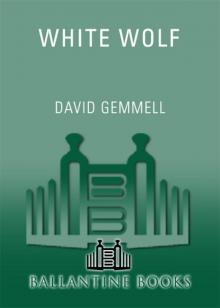 White Wolf
White Wolf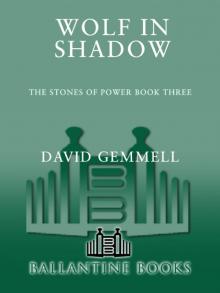 Wolf in Shadow
Wolf in Shadow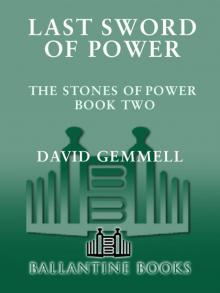 Last Sword of Power
Last Sword of Power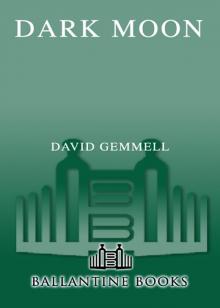 Dark Moon
Dark Moon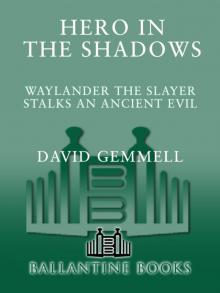 Hero in the Shadows
Hero in the Shadows Gemmell, David - Drenai 09 - Hero In The Shadows
Gemmell, David - Drenai 09 - Hero In The Shadows Waylander
Waylander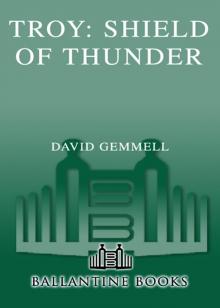 Shield of Thunder
Shield of Thunder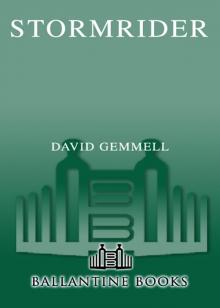 Stormrider Stormrider
Stormrider Stormrider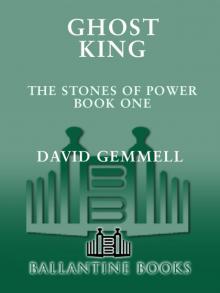 Ghost King
Ghost King Legend
Legend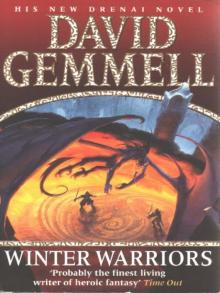 Winter Warriors
Winter Warriors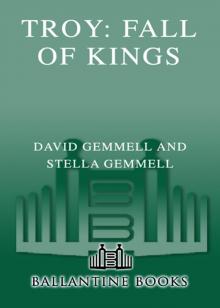 Fall of Kings
Fall of Kings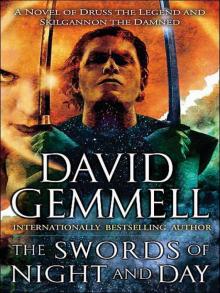 The Swords of Night and Day
The Swords of Night and Day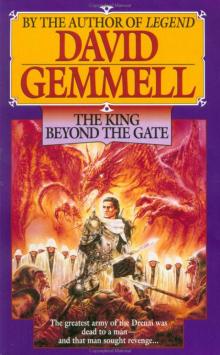 The King Beyond the Gate
The King Beyond the Gate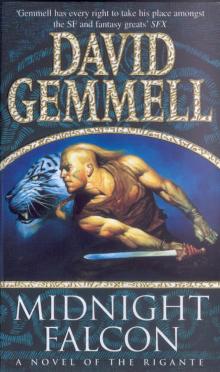 Midnight Falcon
Midnight Falcon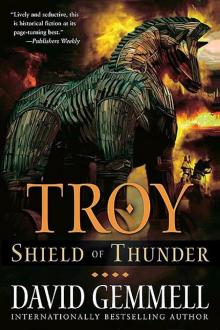 02 - Shield of Thunder
02 - Shield of Thunder In the Realm of the Wolf
In the Realm of the Wolf Ravenheart
Ravenheart The First Chronicles of Druss the Legend
The First Chronicles of Druss the Legend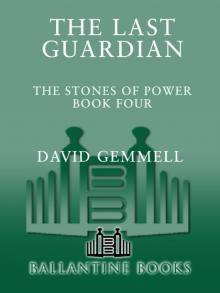 Last Guardian
Last Guardian Stormrider
Stormrider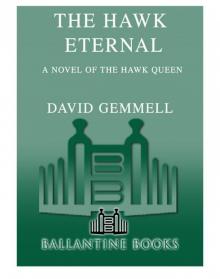 The Hawk Eternal
The Hawk Eternal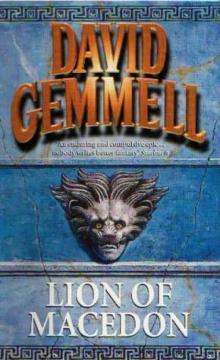 Lion of Macedon
Lion of Macedon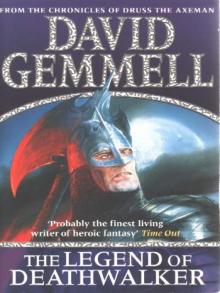 The Legend of Deathwalker
The Legend of Deathwalker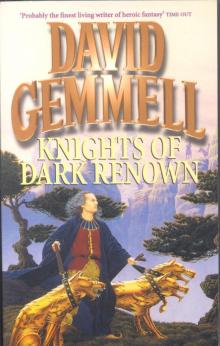 Knights of Dark Renown
Knights of Dark Renown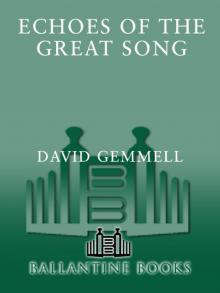 Echoes of the Great Song
Echoes of the Great Song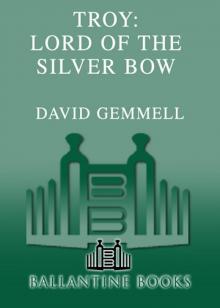 Lord of the Silver Bow
Lord of the Silver Bow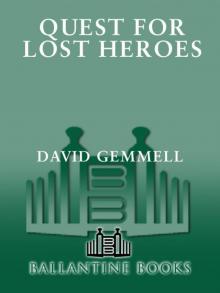 Quest for Lost Heroes
Quest for Lost Heroes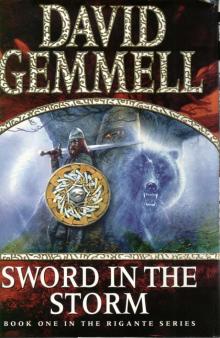 Sword in the Storm
Sword in the Storm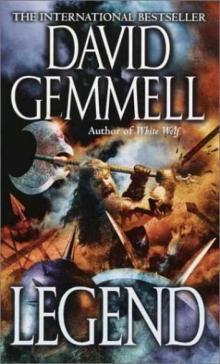 Drenai Saga 01 - Legend
Drenai Saga 01 - Legend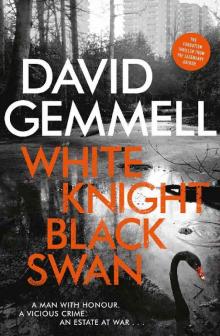 White Knight/Black Swan
White Knight/Black Swan![[Troy 02] - Shield of Thunder Read online](http://i1.bookreadfree.com/i/03/19/troy_02_-_shield_of_thunder_preview.jpg) [Troy 02] - Shield of Thunder
[Troy 02] - Shield of Thunder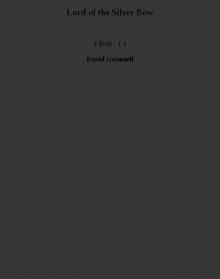 Lord of the Silver Bow t-1
Lord of the Silver Bow t-1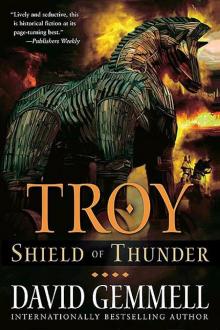 Shield of Thunder t-2
Shield of Thunder t-2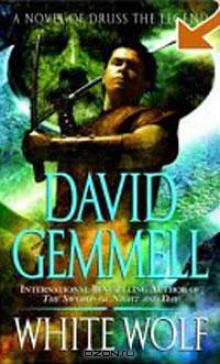 White Wolf: A Novel of Druss the Legend dt-10
White Wolf: A Novel of Druss the Legend dt-10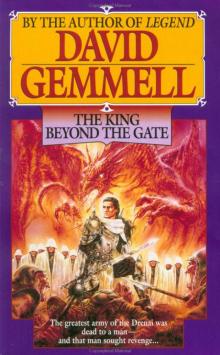 Drenai Saga 02 - The King Beyond the Gate
Drenai Saga 02 - The King Beyond the Gate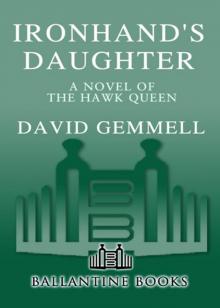 Ironhand's Daughter
Ironhand's Daughter Gemmell, David - Drenai 06 - The First Chronicles of Druss the Legend
Gemmell, David - Drenai 06 - The First Chronicles of Druss the Legend The Last Guardian
The Last Guardian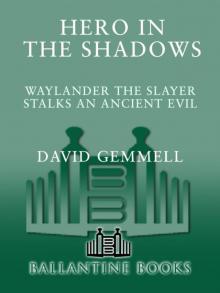 Hero in the Shadows: A Waylander the Slayer Novel
Hero in the Shadows: A Waylander the Slayer Novel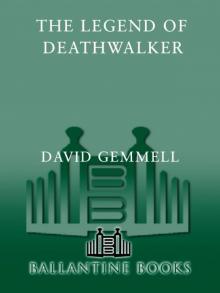 The Legend of the Deathwalker
The Legend of the Deathwalker